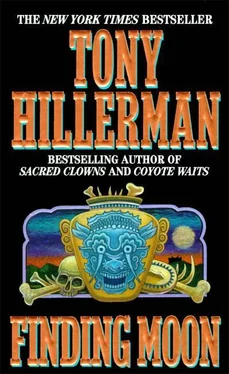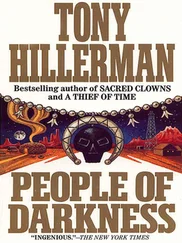Tony Hillerman - Finding Moon
Здесь есть возможность читать онлайн «Tony Hillerman - Finding Moon» весь текст электронной книги совершенно бесплатно (целиком полную версию без сокращений). В некоторых случаях можно слушать аудио, скачать через торрент в формате fb2 и присутствует краткое содержание. Жанр: Триллер, на английском языке. Описание произведения, (предисловие) а так же отзывы посетителей доступны на портале библиотеки ЛибКат.
- Название:Finding Moon
- Автор:
- Жанр:
- Год:неизвестен
- ISBN:нет данных
- Рейтинг книги:4 / 5. Голосов: 1
-
Избранное:Добавить в избранное
- Отзывы:
-
Ваша оценка:
- 80
- 1
- 2
- 3
- 4
- 5
Finding Moon: краткое содержание, описание и аннотация
Предлагаем к чтению аннотацию, описание, краткое содержание или предисловие (зависит от того, что написал сам автор книги «Finding Moon»). Если вы не нашли необходимую информацию о книге — напишите в комментариях, мы постараемся отыскать её.
Finding Moon — читать онлайн бесплатно полную книгу (весь текст) целиком
Ниже представлен текст книги, разбитый по страницам. Система сохранения места последней прочитанной страницы, позволяет с удобством читать онлайн бесплатно книгу «Finding Moon», без необходимости каждый раз заново искать на чём Вы остановились. Поставьте закладку, и сможете в любой момент перейти на страницу, на которой закончили чтение.
Интервал:
Закладка:
Moon took a huge shuddering breath.
“And she came in and took the pistol out of my hand and hugged me and started crying. We were all crying, all three of us.”
“Catharsis,” Julian said. “So you did have a happy ending. Sometimes love can be as effective as faith.”
Moon cleared his throat again. “Ah,” he said. “But that’s not the ending.”
“It couldn’t be,” Julian said. “Your story hasn’t come yet to the great sin you’ve teased me with. Did that involve your father?”
“He died the next year,” Moon said. “When I was fourteen. And my mother mourned for him.”
“And so did you,” Julian said.
“So ‘I had the example. A brave man and a brave woman and some notion of what you give up for love. So I didn’t have any excuse.”
“Excuse for what? Oh, for what you are about to tell me you did?”
“For what I did,” Moon said. “I had killed a man. I was driving drunk and driving an army vehicle off the post without authorization. We did it a lot, but the crime is being caught at it. So I was awaiting trial. Clearly guilty. The charge was homicide committed during the conduct of a felony. Drunk driving being the felony. I was assigned a first lieutenant as defense attorney. He advised me to plead guilty, saving the court time, and plead for leniency. The most I’d get was twenty years. I was terrified.”
“I can see why,” Julian said. “How old were you then, early twenties?”
“I don’t know why I was so frightened. Not for sure, anyway. I think maybe it was because I didn’t know myself very well yet. It seemed that a military prison was not the place I should be spending so much of my life. I felt like I was going to be buried alive.”
“Reasonable,” Julian said.
“My mother was notified, of course, and she came to see me. I told her about the lawyer. What he had said. She said that was intolerable. I said it was also inevitable. And she said surely something could be done. I said no it couldn’t be done, because we had no money for the big law firms and no political clout. I gave her the whole self-pity business. If I couldn’t have freedom, have my life back, at least I could wring some sympathy from my mother. And I did.”
Moon hesitated.
“I even cried,” he added. “I’ll never forget that. I actually cried.”
“Twenty years in prison,” Julian said. “I would have cried too. Who wouldn’t?”
“So my mother went home, and almost right away I got a letter from her. She was marrying Dr. Morick.”
“An,” Julian said.
“I told you Morick was Dad’s doctor. But he also had inherited real estate, and he was smart, and he’d made great investments in California land and in Florida beachfront. And was chairman of the county Democrats and a great friend of a congressman on the House Military Affairs Committee and had all sorts of connections. A lawyer showed up at the stockade, a white-haired man with an assistant carrying his briefcase. He took about fifteen pages of notes on what happened, and who questioned me, and what went on in the military hospital. And-guess what-a little later somebody at a higher level reexamines the charges, and they are reduced to conduct unbecoming a noncommissioned officer, unauthorized use of a military vehicle, and so forth. The penalty becomes loss of rank, loss of six months’ pay, and a general discharge.”
That finished the story for Moon. His confession had been made. He was tired.
Julian considered it. “Someone might say that was a happy ending,” he said. “But it wasn’t. Not for you.”
“She never liked Morick. He was Dad’s doctor and that gave him an excuse to be there a lot, to keep lusting after her. And he was a stuffy, boring, self-important old bachelor more interested in his real estate projects than in practicing medicine. But she wasn’t a very lucky woman, my mother. Her husband gives her a vegetable to care for, and then, when he dies, she has to marry another one to save a weakling son.”
“You don’t think she would have-”
Moon pounded his fist into his thigh. “Never. Never. Never!” Moon said. “She never would have married him. She did it to save her pitiful boy.”
Special to the New York Times
WASHINGTON, April 21-Defense Department officials concluded today that the situation in South Vietnam was deteriorating so rapidly that the United States must plan an immediate evacuation of all Americans and their dependents.
The Tenth Day
FOR MOON MATHIAS, THE FLIGHT from Manila to Puerto Princesa was in the aisle seat of one of those twin-engine prop-jet aircraft that short-hop commuter airlines favor. Moon had already learned to avoid such aircraft when possible. The planes were fitted out for small people and intended for short trips. So used, they were barely tolerable for someone of his dimensions. But the flight from Manila on Luzon Island down the Philippine archipelago and then across the Sulu Sea to Puerto Princesa was anything but short.
While waiting for the consulate to call and tell him he had clearance to visit George Rice, Moon had bought a map of the Philippines and a tourist guidebook. And then, on an uneasy hunch, he bought a large-scale map of Vietnam, Cambodia, and Laos. He put that map in his bag, hoping never to need it. On the Philippines map, he took a scale of distances he marked off on a sheet of hotel stationery and made some calculations. A direct flight from Manila to Puerto Princesa, the capital of Palawan Island and site of its only airport, was just about four hundred miles. But, of course, there was no direct flight. The only one scheduled from Manila took one first to Iloilo, three hundred miles southeast on Panay Island. From there one flew two hundred and fifty miles southwestward across the Sulu Sea to Puerto Princesa. That made five hundred and fifty miles, broken by an hour sitting in an airport in a tiny town, which, Moon’s guidebook said, “had little to offer the tourist except an open-air market where exotic tropical products may be purchased.”
The guidebook made Palawan itself sound equally unpromising, unless one loved to rough it in the tropics. It called the island “one of the world’s few remaining unspoiled paradises,” Its economy was based on fishing “with some subsistence agriculture.” Its population was described as “light, scattered, and largely Malay in ethnic origin.” Looking at it on the map made Moon wonder why the cartographers and politicians had included it as part of the Philippine cluster. It lay like a line drawn from Borneo to Luzon, almost three hundred miles long, from Bugsuc on the south to the tiny settlement of Taytay on the north and only about fifteen or twenty miles wide. It looked to Moon like Bugsuc was a hell of a lot closer to Borneo than Taytay was to any dry land in the Philippines. He measured it out, and it was. Not that it mattered. What mattered was four and a half hours’ flying time in a small seat designed for someone half his size.
Moon Mathias had quit fitting small seats since he started growing seriously in about the fifth grade. But he had made himself proficient at enduring. He sat, legs cramping, neck hurting, expression bland, and listened to the small Filipino who occupied the window seat.
The small Filipino wore a thin mustache that had turned gray. He said his name was Mr. Adar Docoso. He had been a platoon sergeant in the Philippine Scouts. He had fought the Japanese “until General MacArthur sailed away and abandoned us.” Now he was in the scrap metal business. He was flying out to Puerto Princesa to see about buying a Panama-licensed freighter that had been more or less abandoned there because it wasn’t worth fixing its worn-out diesels. He had four sons, all unusually intelligent, and one remarkably beautiful daughter. This out of the way, he wanted Moon to explain to him why the United States of America had chosen to make Hawaii the fiftieth state instead of the Philippines.
Читать дальшеИнтервал:
Закладка:
Похожие книги на «Finding Moon»
Представляем Вашему вниманию похожие книги на «Finding Moon» списком для выбора. Мы отобрали схожую по названию и смыслу литературу в надежде предоставить читателям больше вариантов отыскать новые, интересные, ещё непрочитанные произведения.
Обсуждение, отзывы о книге «Finding Moon» и просто собственные мнения читателей. Оставьте ваши комментарии, напишите, что Вы думаете о произведении, его смысле или главных героях. Укажите что конкретно понравилось, а что нет, и почему Вы так считаете.












